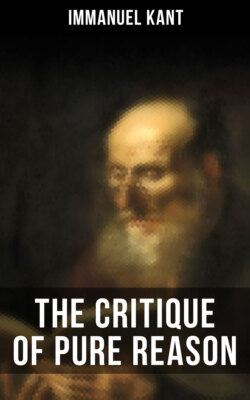Читать книгу The Critique of Pure Reason - Immanuel Kant - Страница 21
На сайте Литреса книга снята с продажи.
§§ 10 Conclusion of the Transcendental Aesthetic.
ОглавлениеWe have now completely before us one part of the solution of the grand general problem of transcendental philosophy, namely, the question: “How are synthetical propositions a priori possible?” That is to say, we have shown that we are in possession of pure a priori intuitions, namely, space and time, in which we find, when in a judgement a priori we pass out beyond the given conception, something which is not discoverable in that conception, but is certainly found a priori in the intuition which corresponds to the conception, and can be united synthetically with it. But the judgements which these pure intuitions enable us to make, never reach farther than to objects of the senses, and are valid only for objects of possible experience.
13 I can indeed say “my representations follow one another, or are successive”; but this means only that we are conscious of them as in a succession, that is, according to the form of the internal sense. Time, therefore, is not a thing in itself, nor is it any objective determination pertaining to, or inherent in things.
14 The predicates of the phenomenon can be affixed to the object itself in relation to our sensuous faculty; for example, the red colour or the perfume to the rose. But (illusory) appearance never can be attributed as a predicate to an object, for this very reason, that it attributes to this object in itself that which belongs to it only in relation to our sensuous faculty, or to the subject in general, e.g., the two handles which were formerly ascribed to Saturn. That which is never to be found in the object itself, but always in the relation of the object to the subject, and which moreover is inseparable from our representation of the object, we denominate phenomenon. Thus the predicates of space and time are rightly attributed to objects of the senses as such, and in this there is no illusion. On the contrary, if I ascribe redness of the rose as a thing in itself, or to Saturn his handles, or extension to all external objects, considered as things in themselves, without regarding the determinate relation of these objects to the subject, and without limiting my judgement to that relation — then, and then only, arises illusion.
